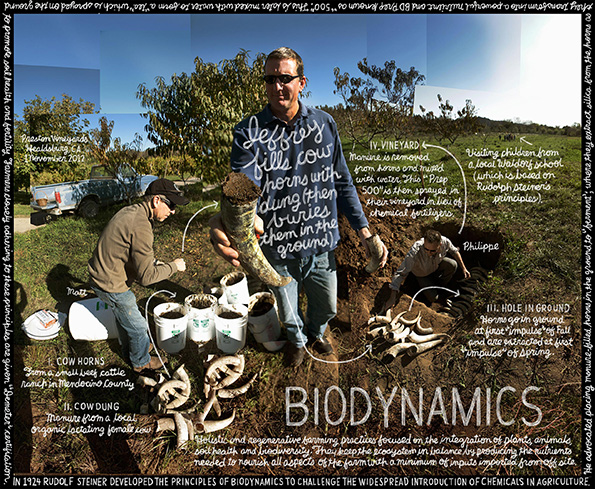Biodynamics is a holistic approach to farming and gardening that takes organic principles to a whole new level. It is about much more than simply not using things like chemical fertilizers, pesticides, or herbicides. While biodynamic farmers do follow organic practices, they expand upon these by managing their farms (including fields, woods, wetlands, plants, animals, and people) as an interconnected whole. A biodynamic farm is an “individuality” that reflects the unique qualities of its particular place, climate, and community.

#Biodynamic farming takes organic principles to a whole new level. @deliciousliving @lexiconproject #foodlist
Biodynamic farming is much more than a method, it is a belief system—a holistic way of seeing and understanding the natural world. Unlike intensive industrial farming, this perspective focuses on regenerative practices, harnessing the solutions that already exist in nature. Farmers are not merely producers, they are stewards of the land, responsible for balancing science and intuition. They are the keepers of the living organism that is the farm, providing medicine for the Earth. In doing so, farmers bring about maximum expression of the land.
Rudolf Steiner (1861-1925), founder of the biodynamic approach to agriculture, was a highly trained scientist and respected philosopher in his time, who later in his life came to prominence for his spiritual-scientific approach to knowledge called “anthroposophy.” In the domain of agriculture, Steiner was the first to point to the danger of synthetic fertilizers, which were just appearing in his time. He was also the first to bring the perspective of the farm as a single, self-sustaining organism that thrives through biodiversity, the integration of crops and livestock and the creation of a closed-loop system of fertility.
Title: Biodynamics
Location: Preston Vineyards, Healdsburg, CA
Featuring: Jeffrey Westman
Biodynamics is a holistic and regenerative farming practice focused on the integration of plants, animals, soil health, and biodiversity. They keep the ecosystem in balance by producing the nutrients needed to nourish all aspects of the farm with a minimum of inputs imported from off site.
In 1924, Rudolf Steiner developed the principles of biodynamics to challenge the widespread introduction of chemicals in agriculture. He advocated placing manure-filled horns in the ground to ferment, where they extract the silica from the horns as they transform into powerful nutrients. This preparation method is known as “BD Prep 500.” This is later mixed with water to form a “tea” which is sprayed on the ground to promote soil health and fertility. Farmers closely adhering to these principles are given “Demeter” certification.
Meet the keepers of Apricot Lane Farms
“[Biodynamic] farming alone has told me how intelligent nature is,” reflects John Chester. In Southern California, John “focuses on harnessing the solutions that already exist in nature” through trial and error on Apricot Farm. With his wife, Molly, and their dog, Todd, John has found sanctuary on Apricot Farm, where they observe and nurture the symbiotic relationships that thrive on the land.
Three things you can do
Now that we’ve been introduced to the farm as a living, unified organism, your perception of how to interact with land and food quite possibly has changed. Explore different ways you can nurture an intricate biodynamic farm system:
- Rethink agriculture. Support methods that foster respect for land that produces for us. Check out this catalog of seeds grown in a biodynamic system.
- Familiarize yourself with cosmic rhythms. Biodynamic farming is intimately connected to the light of the sun, the phases of the moons, and the movements of celestial bodies.
- Shop biodynamic! You may find a local farmer is Demeter certified.

What farming practices do you hope will become standard in the future?
For the past three years, the Lexicon of Sustainability has sought out the foremost practitioners of sustainability in food and farming to gain their insights and experiences on this important subject. What began as a photography project to spread their knowledge has grown to include short films, study guides, traveling shows, a book, and a website where people can add their own terms to this ever-evolving lexicon. See more at www.lexiconofsustainability.com.
